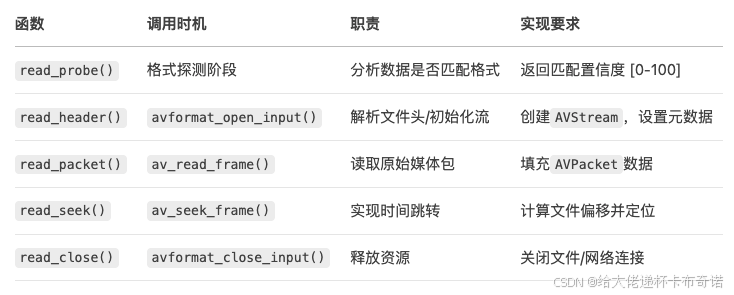1、AVInputFormat 定义
AVInputFormat 是 FFmpeg 公共 API 中用于描述和操作一个解复用器(Demuxer) 的核心数据结构。你可以将它理解为一个解复用器的"说明书"或"接口契约"。
AVInputFormat是ffmpeg里面的解复用器对象,AVInputFormat类似COM接口的数据结果,表示输入文件容器格式。着重于功能函数,一种文件格式对应一个AVInputFormat结果,AVInputFormat 是输入格式(解复用器/Demuxer)的核心数据结构,负责识别和解析各种媒体容器格式(如 MP4、MKV、FLV 等)。在程序中运行多个实例。
- AVInputFormat: 公共API结构体。它是面向开发者(使用 FFmpeg 库的应用程序)和框架的接口。你在代码中看到和操作的都是它。
- FFInputFormat: 内部实现结构体。它在 FFmpeg 源代码内部使用,是每个具体解复用器的"私有数据"结构。它通常第一个成员就是 AVInputFormat pub。
cpp
typedef struct AVInputFormat {
const char *name; // 输入格式的名称
const char *long_name; // 输入格式的详细名称
int flags; // 输入格式的属性标志
const char *extensions; // 输入格式的扩展名
const struct AVCodecTag * const *codec_tag; // 指向AVCodecTag结构的指针,
// 用于存储编解码器标签
const AVClass *priv_class; // 私有数据的AVClass结构体
const char *mime_type; // 输入格式的MIME类型
} AVInputFormat;各个成员的含义如下:
- name: 一个字符指针,用于表示AVInputFormat的名称。
- long_name: 一个字符指针,用于表示AVInputFormat的详细名称。
- flags: 一个整数,用于表示AVInputFormat的属性标志。
- extensions: 一个字符指针,用于表示AVInputFormat的扩展名。
- codec_tag: 一个指向AVCodecTag结构的指针,用于存储编解码器标签。
- priv_class: 一个指向AVClass结构体的指针,用于表示AVInputFormat的私有数据类。
- mime_type: 一个字符指针,用于表示AVInputFormat的MIME类型。
2、AVInputFormat 作用阶段
AVInputFormat 作用在解析音视频流文件或者网络中的时候,其作用是分离Audio 、Video、Subtitle等信息。
- 自动格式探测:当你使用 avformat_open_input() 但将第二个参数(AVInputFormat)设置为NULL时,FFmpeg会启动自动探测流程。它会读取文件开头的一部分数据(或来自网络的数据流),调用所有已注册格式的 read_probe 函数,与文件特征进行匹配,从而确定最合适的解封装器。
- 手动指定格式:如果你提前知道媒体文件的精确格式,可以直接通过 av_find_input_format() 函数获取对应的 AVInputFormat 结构体,然后在 avformat_open_input() 中传入。这样做可以跳过自动探测步骤,提升打开文件的效率。
cpp
avformat_open_input()
└──-> ff_probe_input_buffer()
└──-> 调用所有 AVInputFormat 的 read_probe() -> 得分最高的匹配
└──-> selected_iformat->read_header()
└──-> 绑定 priv_data
└──-> avformat_find_stream_info()
└──-> 不断调用 selected_iformat->read_packet()
└──-> 循环读取时调用 selected_iformat->read_packet()3、FFInputFormat 输入格式解复用器
FFInputFormat 是输入格式(解复用器)的核心数据结构,负责管理媒体文件的格式解析和解封装过程。
其是 FFmpeg 内部用于描述和实现一个解复用器(Demuxer) 的核心数据结构。你可以把它理解为一个解复用器的"类"或"蓝图"。
它的主要职责是:
- 识别输入媒体容器的格式:比如判断一个文件是 MP4、FLV、AVI 还是 MP3。
- 解析媒体容器的元信息:读取文件头等信息,获取媒体的总时长、创建时间、码率、音视频流数量等。
- 读取数据包(Packets):从容器中分离出一个个的数据包(通常是压缩后的视频帧或音频帧),并将它们交给解码器。
简单来说,FFInputFormat 回答了以下问题:
- "这个文件是什么格式?" (通过 read_probe 函数)
- "这个文件里有多少路流?它们的编码格式、分辨率、采样率是什么?" (通过 read_header 函数)
- "如何从这个文件中读取一帧帧的数据?" (通过 read_packet 函数)
下面是FFInputFormat 具体的定义:
cpp
typedef struct FFInputFormat {
AVInputFormat p; // 公共API可见部分
enum AVCodecID raw_codec_id;
int priv_data_size; // 私有数据结构大小
int flags_internal;
// 关键指针函数
int (*read_probe)(const AVProbeData *);
int (*read_header)(struct AVFormatContext *);
int (*read_packet)(struct AVFormatContext *, AVPacket *pkt);
int (*read_close)(struct AVFormatContext *);
int (*read_seek)(struct AVFormatContext *,
int stream_index, int64_t timestamp, int flags);
int64_t (*read_timestamp)(struct AVFormatContext *s, int stream_index,
int64_t *pos, int64_t pos_limit);
int (*read_play)(struct AVFormatContext *);
int (*read_pause)(struct AVFormatContext *);
int (*read_seek2)(struct AVFormatContext *s, int stream_index,
int64_t min_ts, int64_t ts, int64_t max_ts, int flags);
int (*get_device_list)(struct AVFormatContext *s, struct AVDeviceInfoList *device_list);
} FFInputFormat;关键指针函数映射关系:

4、FFInputFormat 结构定义示例
cpp
const FFInputFormat ff_rtp_demuxer = {
.p.name = "rtp",
.p.long_name = NULL_IF_CONFIG_SMALL("RTP input"),
.p.flags = AVFMT_NOFILE,
.p.priv_class = &rtp_demuxer_class,
.priv_data_size = sizeof(RTSPState),
.read_probe = rtp_probe,
.read_header = rtp_read_header,
.read_packet = ff_rtsp_fetch_packet,
.read_close = sdp_read_close,
};
const FFInputFormat ff_mov_demuxer = {
// 定义AVInputFormat
.p = {
.name = "mov,mp4,m4a",
.long_name = "QuickTime / MOV",
.flags = AVFMT_NO_BYTE_SEEK,
.extensions = "mov,mp4,m4a",
.priv_class = &mov_class,
},
.priv_data_size = sizeof(MOVContext), // 私有数据大小
.read_header = mov_read_header, // 头解析函数
.read_packet = mov_read_packet, // 包读取函数
.read_close = mov_read_close, // 关闭函数
.read_seek = mov_read_seek, // 跳转函数
.check_bitstream = mov_check_bitstream,// FFmpeg7新增
.init = mp4_init, // 初始化函数
.flags_internal = FF_FMT_ALLOW_FLUSH, // 内部标志
};
//以Mp4为例:
typedef struct MOVContext {
int64_t moov_offset; // 'moov' box位置
int time_scale; // 时间基准
AVStream **streams; // 流指针数组
// ... MP4特有字段
} MOVContext;
// 在read_header中初始化
static int mov_read_header(AVFormatContext *s) {
MOVContext *mov = s->priv_data; // 访问私有数据
mov->time_scale = 1000; // 设置默认时间基准
// ...
}5、AVInputFormat 使用示例
cpp
#include <libavformat/avformat.h>
int main() {
AVFormatContext *fmt_ctx = NULL;
const AVInputFormat *input_fmt = av_find_input_format("mp4");
avformat_open_input(&fmt_ctx, "input.mp4", input_fmt, NULL);
avformat_close_input(&fmt_ctx);
return 0;
}